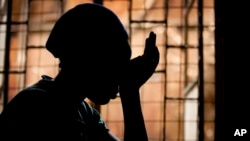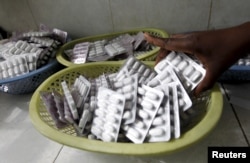On the occasion of World AIDS Day, certain groups at high risk for HIV and AIDS in Kenya remain marginalized when it comes to accessing testing and treatment.
Bernard Adede, 22, was born HIV-positive. His parents both died shortly after.
Adede said it hasn’t always been easy to get treatment at Kenya’s public hospitals. He said the staff generally ignores young people. He has missed treatments because he didn’t want to deal with the stigma.
“There’s hospitals where they are so harsh, like public hospitals. They are so harsh for adolescents, when you go to take medication, the way they treat you, you feel like you are not comfortable to be there, so you abscond of going to take medication and [it’s] better stay at home than going to take medication,” he said.
AIDS is the leading cause of death among adolescents in Kenya and throughout Africa. Kenya’s ministry of health said about 10,000 HIV-positive teenagers die each year there due to delayed treatment.
Regular monitoring and treatment with anti-retroviral drugs can slow the virus’ spread in the body and delay the onset of AIDS.
The National AIDS Control Council said there are approximately 1.6 million people confirmed to be living with HIV/AIDS in Kenya, but only about half are on ARV therapy. Authorities believe there are as many as half a million more HIV-positive people in Kenya who haven’t been tested.
Disabled face challenges too
People living with disabilities in Kenya report challenges accessing HIV care despite laws that guarantee equal access to public services.
“For example, when I go to access care at the hospitals what I have found out is that there’s an attitude issue,” said Charles Nyangilo, who is deaf and spoke through a sign language interpreter. “At the same time [as] we have a communication barrier, challenges…[The] cost of medicine has also become an issue due to the cost sharing that has come up recently.”
LGBT
Health workers say stigma and fear can keep lesbian, gay and transgender people from coming in for HIV services. Homosexuality is illegal in Kenya.
Edith Okoth, a health worker at the NGO Liverpool Voluntary Counseling and Testing Health, said instead of waiting for patients to come to them, her group is having success with an outreach program called “on-spot enrollment.” The program targets high-risk communities like MSM’s, or men having sex with men.
“So we have the MSM’s, the young women and girls, and also the female sex workers. So through this we are able to do the outreaches for these people to know their status, because these are people who are at most, we call them at high risk, so once they are able to know their status we are able to enroll them immediately,” she explained.
Since the start of the program five years ago, she said they have reached 15,000 people who may not have otherwise come in for testing.





